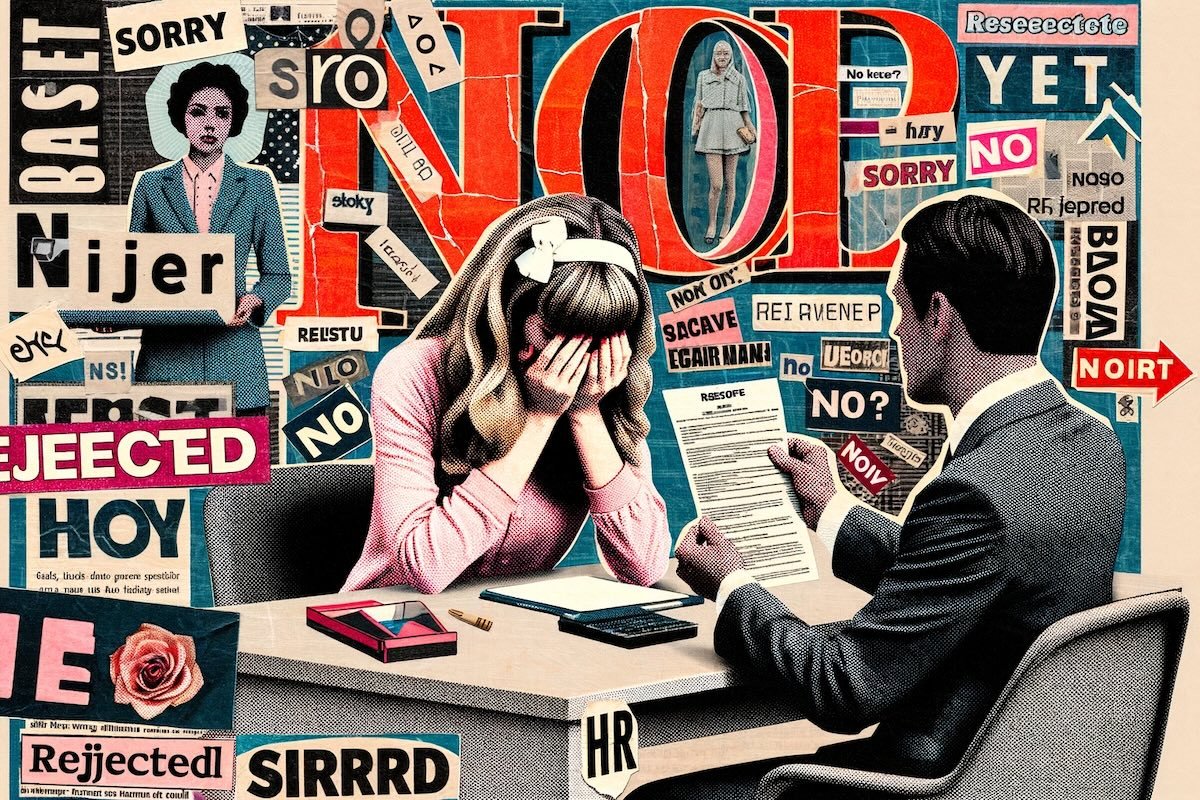Photo by Vildan Hanne Dogan
When starting a job hunt, having to decline job offers is probably not high on your list of worries.
At the end of the job search road, we hope to match with our next job, but what happens when the offer you receive is not the offer you wanted? What if you're holding out for another job or a better offer?
Sometimes, the hiring process surprises us—and we're left to make difficult decisions to match our
current career goals.
In this article, we're going to explore what to do when you received a job offer that isn't the right fit for you. We'll make sure your reasoning for rejecting an offer is sound, and we'll lend you some sample emails that you can write to say, "Thanks, but no thanks."
How to Politely Decline a Job Offer
Let's get one thing out of the way right off the bat. You don't need to feel guilty if the job offer doesn't align with your current career path. You don't need to apologize profusely, overexplain your reasoning, or accept a job offer out of panic.
Sometimes, job offers aren't what we hoped or imagined. Just like a hiring manager might pass you over for a job, you can do the same as a candidate.
1. Offer Appreciation
The interview process is a huge time suck for everyone, so show appreciation for the time spent on phone calls, Zoom calls, in-office interviews, and for the offer itself.
Express gratitude to the person who helped you navigate the process.
Pro Tip: It never hurts to include a compliment in your "rejection email." If you have something nice to say, say it!
2. Briefly Explain Your Reasons
We'll get into common reasons that candidates pass on job offers later on. However, our advice remains the same, no matter what. You don't need to explain every detail. Keep it to one brief reason, and proceed to the next step.
If a hiring manager or recruiter replies asking for more feedback, you can go deeper into detail.
3. Keep in Touch
If this tip reminds you of signing a yearbook "K.I.T!" well, good! This is the energy we think you should bring to the end of your so-called rejection letter.
Unless you're rejecting a job offer because the
company seems toxic or unprofessional, keep the door open for future opportunities. Furthermore, if you found that you disliked the company itself, but enjoyed speaking with the interviewer or recruiter, keep that person in your professional network.
Before signing off with your own best regards, share contact information. Include your LinkedIn, a personal email, and maybe a link to your work portfolio.
5 Reasons to Decline a Job Offer + Email Template You'll Need
In this section, we're exploring why candidates decline job offers. Whatever your reasoning, we have a few simple rules when rejecting a job offer.
- Be respectful and appreciative.
- Lead with politeness.
- Be true to yourself.
We will be sharing a few more email templates, but you might want to choose a different medium to discuss a job offer. Any job offer, whether email or verbal, should allow a candidate time to think things over.
From there, you can choose to schedule a phone call or video call to discuss the offer or you can write a concise rejection letter.
1. When You Saw Too Many Red Flags
Imagine this scenario. You apply for the dream position at your dream company—and they call you to schedule an interview! You're absolutely over the moon excited, and you're already imagining yourself in the role—then, reality hits.
As you go through the interview process, you start noticing
red flags, inconsistencies, and general discord. You realized, much to your dismay, that the company culture is not for you.
That one saying "never meet your heroes" can also apply to so-called "dream companies," too. Don't be afraid to relinquish "the dream" if it isn't meant to be. Trust your gut.
If you took the time to take off your rose-colored lenses long enough to notice really bad red flags, good for you.
The danger of the "
dream company" is most damaging when a candidate ignores the signs of toxic work environment in favor of the dream itself.
So, when you're rejecting a job because it seems
toxic,
hostile, or simply not what you had expected, do your best to keep your explanation brief.
You don't need to share the negative elements of your decision, especially if you might want to keep in touch with anyone at the company.
Here is a template to use to reject an offer due to red flags:
Hello [NAME],
Thank you for the offer for [JOB TITLE] at [COMPANY NAME] and for walking me through a communicative interview process.
However, after careful consideration, I have to decline this offer. As you know, it has been a dream of mine to work at [COMPANY NAME], but after much consideration, I have decided that [POSITION TITLE] is not the great fit I had hoped it might be.
Thank you again for your time and consideration. I wish you the best of luck in finding the perfect fit for [JOB TITLE].
Best regards,
[NAME]
2. When You Receive Multiple Job Offers
Oh, look at you! When you receive multiple offers, you might feel like you're on top of the world. Even, and especially when, both job offers are attractive, you have a really difficult decision to make in order to choose the right job for your professional development and for your life.
- 1. Make sure the offer is 100% official (and avoid a job offer being rescinded).
- 2. Examine the financial benefits.
- 3. Determine the effect a new job will have on your personal life.
- 4. Choose a job that lets you use and develop your skills.
- 5. Do research on the company, its employees, and its former employees.
- 6. Consider other benefits (besides salary).
- 7. Go with your gut.
3. When the Offer Is Not Good Enough
Throughout the interview, the interviewer says things like, "Sounds good!" and "I think we're aligned."
Then, the job offer comes through—and it bears no resemblance to what you spoke about through your multiple interviews.
At this point, as a candidate, you have two options:
Option One: You can counteroffer the offering company while citing figures mentioned in the interview.
Option Two: You can hit the road because they just wasted your time and energy.
If you're feeling generous, you can always give the benefit of the doubt. Did they forget to add that extra zero? Did they hit the "6" key when they meant to hit the "9" key?
Here's an email template for the low-low job offer:
Hello [NAME],
Thank you for the time and energy you spent throughout this hiring process. I loved learning about the [JOB ROLE] position and I think it's a good fit for my skills and my experience in my role as [CURRENT POSITION].
While I was absolutely thrilled to see the job offer land in my inbox, the offer of [SALARY NUMBER] is much lower than we discussed throughout the process. For reference, we had discussed a salary range between [NUMBER RANGE].
If this is a mistake, I'd be happy to revisit the salary expectations we aligned on throughout the interview. Let me know the best time to do so.
If this is the offer, I'll have to politely decline at this point.
Thank you for your time and good luck with your hiring process.
Kind regards,
[NAME]
4. When You Love the Company, But Not the Job
Just like some applicants fluff up their resumes, sometimes hiring managers do the same with their job descriptions. To avoid being bamboozled by an inaccurate job title, ask questions like these:
- What does a day look like in this role?
- What does a week look like in this role?
- What software should I be expected to know and use?
- What sort of support do I have in this role?
Here's an email template to decline a job offer due to job title confusion:
Hello [NAME],
Thank you for the time and energy you spent throughout this hiring process.
While I enjoyed the interview process, I believe the job title of [JOB TITLE] is inaccurate when compared to the duties and responsibilities. After looking through similar roles, I believe this role is close to [BETTER JOB TITLE].
As a result, I don't believe the compensation package and salary matches the responsibilities and job function. I'd be happy to discuss my salary requirements for an enhanced title of [BETTER JOB TITLE].
If not, I will have to decline the offer at this time, but I would love to stay connected if another opportunity arises.
Thank you for your time, and good luck with your hiring process.
Kind regards,
[NAME]
Pro Tip: If you'd like to link to your salary research for both jobs, do it. This will show the recruiter that the job title is misrepresented.
5. When You Decide to Stay at Your Current Job
DISCLAIMER: Recruiters and hiring managers really don't like it when you use a job offer as a bargaining chip to get a raise from your current employer.
Just like you don't want a hiring manager wasting your time when you suspect they were always planning to hire from within anyway, you don't want to waste their time either.
This is a call for some decency and honesty, but I digress.
If you have decided to stay in your current position, you can choose whether or not to mention that fact. Sometimes, candidates launch a job search and learn that they actually like their current job.











